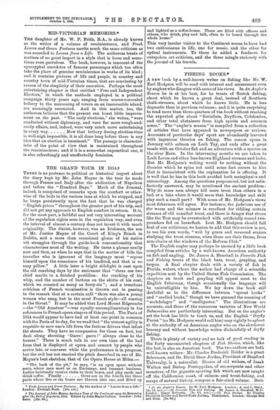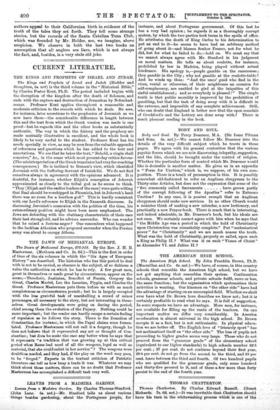FISHING BOOKS.* A ifzw book by a well-known writer on
fishing like Mr. W. Earl Hodgson will be read with interest and amusement even by anglers who disagree with some of his views. In An Angler's Season he is at his best, for he treats of Scotch fishing, about which he knows a great deal, instead of Southern chalk-streams, about which he knows little. He is less dogmatic than in previous volumes ; and it is quite surprising to read more than three-quarters of the book without reaching the expected gibe about "Socialists, Dryfliers, Cobdeiaites, and other total abstainers from high spirits and common sense." The "angler's season" is compiled from a collection of articles that have appeared in newspapers or reviews. Accounts of particular days' sport are abundantly leavened with ingenious theories on fishing. The season opens in January with salmon on Loch Tay, and ends after a great tussle with an October fish and an adventure with a spectre on the river Earn. In the intervening months we are taken to Loch Leven and other less-known Highland streams and lochs. But Mr. Hodgson's writing would be nothing without the theories which he spins out until some fact occurs to him that is inconsistent with the explanation he is offering. It is well that he has in this book avoided both metaphysics and entomology. Among the questions propounded, but not satis- factorily answered, may be mentioned the ancient problem : Why do some men always kill more trout than others in a loch or a lake where it would seem that knowledge and skill play such a small part? With some of Mr. Hodgson's views most fishermen will agree. For instance, the judicious use of the worm and the minnow is excellent for ridding certain streams of old cannibal trout, and there is danger that rivers like the Test may be overstocked with artificially reared two- pounders fed on horseflesh. Lest Mr. Hodgson should fall foul of our criticisms, we hasten to add that this review is not, to use his own words, "writ by grave and reverend seniors studying the trout streams, when these are their theme, from arm-chairs at the windows of the Reform Club."
The English angler may perhaps be amused by a little book compiled from articles by a well-known American authority on fish and angling. Dr. James A. Henshall in Favorite Fish and Fishing treats of the black bass, trout, grayling, and tarpon. A final chapter deals with a variety of fish in Florida waters, where the author had charge of a scientific expedition sent by the United States Fish Commission. The chapters on trout and grayling will appeal most to the English fisherman, though occasionally the language will be unintelligible to him. We lay down the book still doubtful as to the difference between " sproat hooks" and " snelled hooks," though we have guessed the meaning of " sockdolager " and "snolligoster." The illustrations are accurate, and those of the numerous varieties of New World Salmonidae are particularly interesting. But on the angler's art the book has little to teach us, and the English " Dryfly Purist" (as Mr. Hodgson would call him) may rightly be aghast at the audacity of an American angler who on the slenderest hearsay and without knowledge writes disdainfully of dryfly fishing.
There is plenty of variety and no lack of good reading in the forty unconnected chapters of Fish Stories, which, like the last, is also an American book. The two authors are both well-known writers : Mr. Charles Frederick Holder is a great fisherman, and Dr. David Starr Jordan, President of Stanford University, is a naturalist. Stories of old writers, of Izaak Walton and Bishop Pontoppidan, of sea-serpents and other monsters, of the gigantic sporting fish which are now caught off the Californian coast, of salmon- and trout-fishing, and scraps of natural history, compose a fair-sized volume. Both
• al An Angler's Season. By W. Earl Hodgson. London : A. and C. Black. 13a. ud, net.]—(2) Favorite Fish and Fishing. By James A. Heaaball. MD. London: Grant Richards. [3s. 6d. net.]—(3) Fish Stories. By Charles Frederick Holder and David Barr Jordan. Illustrated. London: George Bell and Bons. [7s. ed.]
authors appeal to their Californian birth in evidence of the truth of the tales they set forth. They tell some strange stories, but the records of the Santa Catalina Tuna Club, which was founded by Mr. Holder, are, we imagine, above Suspicion. We observe in both the last two books an assumption that all anglers are liars, which is not always the fact, and, besides, is a very stale old joke.



























































 Previous page
Previous page